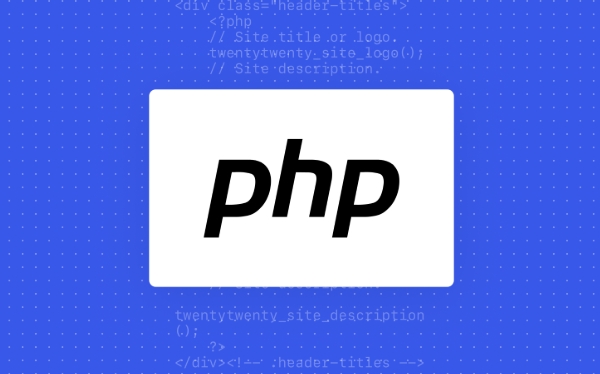 Backend Development
Backend Development
 PHP Tutorial
PHP Tutorial
 The Subtleties of PHP Output: `echo` as a Language Construct vs. `print` as a Function
The Subtleties of PHP Output: `echo` as a Language Construct vs. `print` as a Function
The Subtleties of PHP Output: `echo` as a Language Construct vs. `print` as a Function
Jul 26, 2025 am 09:30 AMecho is a language construct without a return value, accepts multiple arguments, and cannot be used in expressions; 2. print behaves like a function, returns 1, accepts only one argument, and can be used in expressions; 3. echo is slightly faster but the performance difference is negligible in practice; 4. use echo for general output and multiple arguments, and print when its return value is needed in expressions, making echo the preferred choice for most PHP developers.

When working with PHP, developers often use echo and print interchangeably to output data. While they seem nearly identical in practice—both send strings to the browser or console—there are subtle but meaningful differences rooted in how PHP treats them internally: echo is a language construct, and print is a function. Understanding this distinction helps clarify performance, usage, and behavior in edge cases.

1. echo Is Not a Function — It’s a Language Construct
Because echo is a language construct, it doesn’t behave like a typical function. This means:
- You cannot use it in contexts expecting an expression (like inside conditional ternary operations or function arguments).
- It has no return value (technically returns
void). - It can accept multiple arguments separated by commas.
echo "Hello", " ", "World"; // Valid: outputs "Hello World"
You can't do this with most functions, but echo’s syntax flexibility comes from its status as a built-in language feature, not a function.

However, this also means you can’t assign echo to a variable or pass it as a callback:
$func = echo; // Fatal error!
2. print Is a Function (Sort Of) — And Returns a Value
Despite looking and acting a lot like echo, print is technically a language construct that behaves like a function—specifically, it returns an integer value (1) upon successful execution.

This return value allows print to be used in expression contexts, which echo cannot.
$result = print "Hello"; echo $result; // Outputs: 1
And because it returns a value, you can use print in places where an expression is needed:
$var = (false) ? 'yes' : print 'default'; // Works fine
But note: print only accepts a single argument, so you can’t do:
print "Hello", "World"; // Parse error!
Instead, you must concatenate:
print "Hello" . "World"; // OK
3. Performance: Does It Matter?
Historically, there were debates about performance differences between echo and print.
echois very slightly faster thanprintbecause it doesn’t return a value and has simpler internal handling.- However, in real-world applications, the difference is negligible—we’re talking nanoseconds per call.
Unless you're outputting millions of strings in a tight loop (which is rare), performance should not drive your choice.
That said, if you're writing performance-critical code or optimizing for micro-benchmarks, echo wins by a hair.
4. Practical Usage and Best Practices
So which should you use?
| Use Case | Recommendation |
|---|---|
| Outputting simple strings or variables | echo |
| Need to output multiple values without concatenation | echo |
| Using output inside expressions or assignments | print |
| Working with ternary operators | print |
| General scripting and templates | echo |
Most PHP developers prefer echo for everyday output because:
- It’s more flexible with multiple arguments.
- It's the de facto standard in templates (like in Laravel Blade or raw PHP views).
- No return value means less chance of unintended side effects.
print sees far less use, but it's handy when you need something to both output and evaluate as true.
Summary of Key Differences
- ?
echo→ language construct, faster, multiple args, no return - ?
print→ function-like construct, returns 1, single arg, usable in expressions - ? Neither takes parentheses unless required by syntax (e.g., in complex expressions)
- ? Both send output to the browser or stdout
Examples:
echo "A", "B", "C"; // OK
print "A", "B"; // Error
print("Hello"); // OK (parentheses allowed)
echo ("Hello"); // OK, but parentheses don't make it a functionBasically, use echo unless you specifically need the return value of print. The distinction isn't critical for most projects, but knowing the subtleties makes you a sharper PHP developer.
The above is the detailed content of The Subtleties of PHP Output: `echo` as a Language Construct vs. `print` as a Function. For more information, please follow other related articles on the PHP Chinese website!

Hot AI Tools

Undress AI Tool
Undress images for free

Undresser.AI Undress
AI-powered app for creating realistic nude photos

AI Clothes Remover
Online AI tool for removing clothes from photos.

Clothoff.io
AI clothes remover

Video Face Swap
Swap faces in any video effortlessly with our completely free AI face swap tool!

Hot Article

Hot Tools

Notepad++7.3.1
Easy-to-use and free code editor

SublimeText3 Chinese version
Chinese version, very easy to use

Zend Studio 13.0.1
Powerful PHP integrated development environment

Dreamweaver CS6
Visual web development tools

SublimeText3 Mac version
God-level code editing software (SublimeText3)

Hot Topics
 The Forgotten Return Value: Practical Use Cases for `print` in Expressions
Jul 27, 2025 am 04:34 AM
The Forgotten Return Value: Practical Use Cases for `print` in Expressions
Jul 27, 2025 am 04:34 AM
Youcanuseprint()inexpressionsfordebuggingbyleveragingitssideeffectwhileensuringtheexpressionevaluatestoausefulvalue,suchasusingprint(...)orvaluetobothlogandreturnaresult;2.Inlistcomprehensions,embeddingprint()withinaconditionlikex>0andprint(f"
 When to Choose `print`: A Deep Dive into Its Functional Nature
Jul 26, 2025 am 09:43 AM
When to Choose `print`: A Deep Dive into Its Functional Nature
Jul 26, 2025 am 09:43 AM
Useprintfordebugging,CLIoutput,simplescripts,andwhenoutputispartoftheinterface;2.Avoidprintinreusablefunctions,productionsystems,andwhenstructuredormachine-parsedoutputisneeded;3.Preferloggingforproductionandseparatediagnosticsfromdataoutputtoensurec
 The Interplay of `echo`, `include`, and Return Values in PHP
Jul 26, 2025 am 09:45 AM
The Interplay of `echo`, `include`, and Return Values in PHP
Jul 26, 2025 am 09:45 AM
includecanreturnavaluelikeafunction,whichbecomestheresultoftheincludeexpression;2.echoincludeoutputsthereturnvalueofinclude,often1ifthefilereturnstrue(defaultonsuccess);3.anyechoinsidetheincludedfileoutputsimmediately,separatefromitsreturnvalue;4.tou
 The `echo` vs. `print` Debate: Unpacking the Micro-Optimizations
Jul 26, 2025 am 09:47 AM
The `echo` vs. `print` Debate: Unpacking the Micro-Optimizations
Jul 26, 2025 am 09:47 AM
echoistechnicallyfasterthanprintbecauseitdoesn’treturnavalue,buttheperformancedifferenceisnegligibleinreal-worldapplications.2.echosupportsmultipleargumentswithoutconcatenation,makingitmoreflexiblethanprint,whichacceptsonlyoneargument.3.printreturns1
 `echo` in the Command Line: A Guide to Effective CLI Script Output
Jul 27, 2025 am 04:28 AM
`echo` in the Command Line: A Guide to Effective CLI Script Output
Jul 27, 2025 am 04:28 AM
echo is a powerful CLI scripting tool for outputting text, debugging, and formatting information. 1. Basic usage: Use echo "Hello,world!" to output text, and it is recommended to add quotation marks to avoid space problems. 2. Enable escape characters: Use echo-e to parse special sequences such as \n, \t to implement line breaks and tabulation. 3. Suppress line breaks: Use echo-n to prevent line breaks, suitable for interactive prompts. 4. Combine variables and command replacement: dynamically output real-time information through echo "Todayis$(date)". 5. Color output: use echo-e"\033[32mSuccess\03
 Clean Code Chronicles: Refactoring Complex `echo` Statements
Jul 27, 2025 am 03:57 AM
Clean Code Chronicles: Refactoring Complex `echo` Statements
Jul 27, 2025 am 03:57 AM
To solve the problem of complex echo statements, logic must be extracted first and then gradually refactored; 1. Preprocess and separate the conditions and variables; 2. Use heredoc or nowdoc to improve the readability of multi-line output; 3. Encapsulate the rendering logic into a reusable and testable function; 4. Use template engines such as Twig to achieve the complete separation of views and logic in large applications; 5. Avoid using echo directly in modern PHP applications, and instead return structured data or rendering through view layers; ultimately, make the code safer, clearer and easier to maintain.
 The True Cost of Output: Analyzing `echo` in High-Traffic Applications
Jul 26, 2025 am 09:37 AM
The True Cost of Output: Analyzing `echo` in High-Traffic Applications
Jul 26, 2025 am 09:37 AM
Echo itself is a lightweight language structure, but frequent use under high concurrency will lead to performance bottlenecks. 1. Each echo triggers buffer judgment, memory allocation, I/O operation and SAPI serialization overhead; 2. A large number of echo calls increase the burden of interpreter scheduling and system call, affecting compression and proxy optimization; 3. The output buffering, string splicing, template engine or return data should be replaced by decentralized echo; 4. The key is to reduce the number of outputs, batch processing, and avoid output in the loop to reduce the overall overhead and ultimately improve response efficiency.
 The Subtleties of PHP Output: `echo` as a Language Construct vs. `print` as a Function
Jul 26, 2025 am 09:30 AM
The Subtleties of PHP Output: `echo` as a Language Construct vs. `print` as a Function
Jul 26, 2025 am 09:30 AM
echoisalanguageconstructwithoutareturnvalue,acceptsmultiplearguments,andcannotbeusedinexpressions;2.printbehaveslikeafunction,returns1,acceptsonlyoneargument,andcanbeusedinexpressions;3.echoisslightlyfasterbuttheperformancedifferenceisnegligibleinpra





